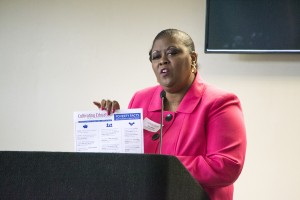By Melanie Urrejola/reporter
As part of the Cultivating Education in the Midst of Poverty summit April 30 on South Campus, former homeless students shared their stories of how they overcame the struggles of living without a roof as well as addictions and dealing with psychological disorders at the same time.
All of the former students said TCC’s Visions Unlimited program helped them achieve personal and professional success and defeat their adverse circumstances.

“I was in and out of shelters since 2003,” TCC graduate Patrick Johnson said. “I have bipolar disorder and addictions, and alcoholism played a major role in my homelessness. I was recruited to Visions in spring of 2010 from Union Gospel Mission.”
After graduating from TCC, Johnson enrolled at the University of Texas at Arlington to pursue a bachelor’s degree in geology. However, because of his bipolar disorder and after a series of unfortunate events, he ran into a few problems.
“Last semester, I started struggling, and this semester I was just falling apart,” he said.
Johnson said he assumed his association with Visions ended when he left TCC, but somehow Tina Jenkins, Visions Unlimited project manager, found out about his problems and called him.
“As busy as she is, she helped me,” he said. ”We found a solution, and I’m now registered for next fall. Visions is for life, and now I know that.”
Another TCC student, Martin Foshee, battled with depression and alcoholism. He sought shelter through the Salvation Army and was later recruited to Visions in fall 2013.
“I was homeless several times before it finally hit me that I needed to change my life,” he said. “I wanted to better myself through education. Visions helped me to continue my goals, and it was my biggest resource in achieving that dream.”
TCC graduate Arthur Wimberly is currently pursuing a bachelor’s degree in social work at UTA.
“The stability of having a place to live and do your homework, just a stable environment overall was a key factor in my success,” he said. “One of the criteria for Visions, once you finish the first two courses, is you have to finish 15 credit hours with TCC in order to be eligible for a housing voucher, and I was fortunate to do that and obtain one of the vouchers, which was one of the key factors in my success.”
Visions partnered with the Fort Worth Housing Authority to help with housing vouchers since spots are limited for house placement. Many students received those housing vouchers fresh out of Visions, Jenkins said. And they could carry those with them even through their four-year institutions.
“We are very grateful for our partnership with Fort Worth Housing,” Jenkins said.
When she was deep in her addiction, TCC student Kelly Swift said she had to call Child Protective Services on herself because she did not want her children to live in the environment she was providing. Two weeks later, CPS came and took her children away.
“It was a hard battle. It took me two years to get my children back,” she said. “During that time, I was sneaking alcohol and lying to CPS and doing whatever I could to get away with my addiction.”
After getting her children back and two months before her case officially closed, she relapsed, got caught and had all her six boys taken away from her once more. She was sent to the Salvation Army but said it was the best thing that could have happened to her.
“I realized how much my children were suffering because of my addiction, and I got better,” she said. “I was reunited with my 2-year-old after 11 months in foster care, and I’m looking forward to getting back with my 12-year-old and 14-year-old this summer. I’m looking forward to being able to spending time with all six of my boys.”
Prior to attending college, Swift had only a sixth-grade education. She has qualified for a housing voucher to help her provide her children with a proper place to live.
Another panelist, LaDoris Pope, now in graduate school, shared her story of being homeless with her teenage daughter.
“A support system is one of the best things that were provided for us, regardless where it comes from,” Pope said. “One of the most important things that was done for my daughter during that time was that the shelter did not pick up my daughter from her school with the Gospel label on that bus. That helped her in her self-esteem. And strangely enough, she came home one day, and she said she was homeless.”
Pope said one day her daughter mentioned her situation to her high school friends and was surprised to hear that some of them also admitted to living in a shelter.
“As parents, we have to protect our children from the stigma of homelessness,” she said. “We should not label people based on their struggles. And that is why this program is so important.”
